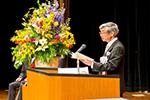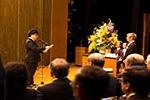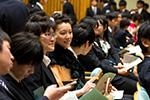2015/03/27
On Tuesday, March 24, 2015, a graduation ceremony was held in the Millennium Hall and 355 students received diplomas.
At the ceremony, President Ogasawara handed over diplomas to the students and gave them a congratulatory speech, followed by the speech of Mr. Hiroshi Koyama, the Executive Director of the Foundation for Nara Institute of Science and Technology.
Then Best Student Awards were conferred to 13 winners by the Foundation.
At the party held after the ceremony, graduates enjoyed the party together with President, Executive Directors and their supervising professors in a friendly atmosphere.
*Number of Graduates in March
【Master's Graduates】
Information Science 128 (14 International students)
Biological Sciences 91 (3 International students)
Materials Science 97 (3 International students)
【Doctoral Graduates】
Information Science 11 (3 International students)
Biological Sciences 11 (1 International student)
Materials Science 16 (3 International students)
【Graduates who completed the Doctoral program by submitting the dissertation】
Biological Sciences 1
Total 355
【Congratulatory Remarks to Graduating Students, Graduation Ceremony, Spring 2015】
First, I would like to offer my heartfelt congratulations to 316 master's program students and 39 doctoral program students who have been awarded degrees today. As a result, the total number of master's degree recipients from NAIST has reached 6573, while that of doctoral degree recipients has totaled 1238. Among today's graduates are 27 international students from 14 countries, bringing the total number of NAIST graduates from overseas to 365 from 54 countries.
It pleases me greatly to see our network of graduates continuing to expand worldwide. On behalf of NAIST, I would also like to congratulate and thank the families of the graduates for having supported them during their years at NAIST. Let me express my gratitude to all the people who kindly supported the study and life of our international students.
While a number of today's master's program graduates will continue on to rigorous studies as doctoral students, the majority of you will begin new, independent lives for working in industry or academia as researchers, engineers, or professionals with a master's or doctoral degree.
Currently changes are occurring around the world.
As is said too often today, the increase in cross-border mobility of information, people and goods is accelerating economic development in Asian and African countries, which highlights the importance of addressing several imminent global issues, such as global resource and energy scarcity and global climate change, in a manner compatible with human activities, thereby ensuring sustainable development of our society. To this end, we must reform the current model of societal development, which simply places focus on the pursuit of material affluence.
In this light, we may say that we are in the age when there is no precedent or roadmap to follow.
Science and technology lie behind these new developments, and will bring drastic changes to society.
For example, it has been estimated that in the United States, half of all human jobs will be taken over by machines within the next 10 to 20 years, and more than half of American children who have just started elementary school will end up in jobs that do not even exist today after they graduate from universities.
In Japan, it is argued that "At the forefront of today's research are breakthroughs in measurement, analysis, and computational technology that are rapidly expanding our understanding of natural and social phenomena. Consequently, scientific research itself is rapidly expanding and is in a constant state of flux, against the backdrop of: ongoing increases in the amount of information available on internet and drastic progress in computational science that are bringing about faster information processing speeds;
and the development of transportation and telecommunications networks that make possible unprecedented speed in the dissemination and sharing of information. In broad domains such as life science and materials science, new interdisciplinary and multidisciplinary fields are being developed, and the frontiers of knowledge are being expanded rapidly." In other words, developments in ICT technology serve as a basis for the rapid expansion of frontier knowledge in fields such as biological and materials sciences. In fact, we are seeing a paradigm shift in the field of biology, as symbolized by the term "big data biology."
We should also notice the fact that the relationship between fundamental research and application of its results to society is changing. It is indicated that "As a result of the expansion of the frontiers of knowledge, high quality knowledge is constantly emerging at the forefront of research and it becomes difficult to predict which kind of knowledge will lead to the creation of new social value."
In this light, some researchers maintain that we are now in the midst of a new revolution in science and technology. As you are going to become active members of society as either researchers, engineers or professionals, how can you contribute to such societal innovation? In this regard, I'd like you all to pay special attention to the following part of a report published by a committee of MEXT:
"In order for scientific research to serve as a 'source of national strength' in the current era of rapidly expanding frontiers of knowledge, it is of utmost importance for researchers to challenge themselves to cultivate new knowledge based on their own knowledge, creativity and research skills, and it is vital for researchers to keep in mind and clarify the significance of their own research subject (challenger spirit). To cultivate new knowledge, of course, it is necessary to place a high value on diversity and knowledge of traditional research fields.
In addition, in the current era, you must maintain a broader, comprehensive view to avoid compartmentalized knowledge (well-roundedness). You are also faced with demands to produce new academic domains through cooperation and collaboration with researchers from various fields and a broad range of domestic and foreign counterparts (multi-disciplinarity).
Furthermore, through discussion and verification within the global science community, you must strive to obtain global recognition of your research excellence by proposing new research frameworks, thus contributing beyond national borders (global perspective). Thus, researchers are expected to seek new knowledge in a flexible manner, unlimited by traditional borders between research fields and institutions. As global citizens, you must work hard to both challenge and cooperate with those of different values and cultures, all the while adapting to changes in society and constantly endeavoring to produce novel research findings. In this way, the current era of scientific research strongly calls for "a challenger spirit", "well-roundedness", "multi-disciplinarity", and "a global perspective", so to speak.
While these words are principally directed to researchers, I think they are also relevant to those who are promoting the wider use and spread of science and technology.
As graduates of NAIST, I would like you to keep these words in mind and take an active approach toward the creation of a new society and world by developing and applying new science and technology. Furthermore, for science and technology to contribute to making a new society, it is essential to achieve results in basic research and to apply the results to society. In this sense, I would like to encourage those engaging in basic research to recognize the significance of applying research results for the good of society. Likewise, those pursuing the development, utilization and spread of technologies as solutions to societal problems are expected to continue to pay close attention to the new progress of basic science and technology.
During your years at NAIST, you have not only gained academic expertise but also developed the ability to identify problems, explore and find solutions to these problems, evaluate the outcomes, and write academic papers on the outcomes through discussions with people having various viewpoints during your thesis research.
I am confident that such experiences at NAIST will help you all lead creative lives. Moreover, NAIST's role does not end with us sending you out into society. Rather, the faculty and staff consider that another important role of NAIST is building relationships with the graduates so that you will be able to continue your creative lives in an ever-changing community of science and technology, and in society at large.
In concluding my message, I would like to congratulate you all again.
We look forward to your future success and we will continue to support your future endeavors.
Naotake Ogasawara,President
Nara Institute of Science and Technology, March 24, 2015








